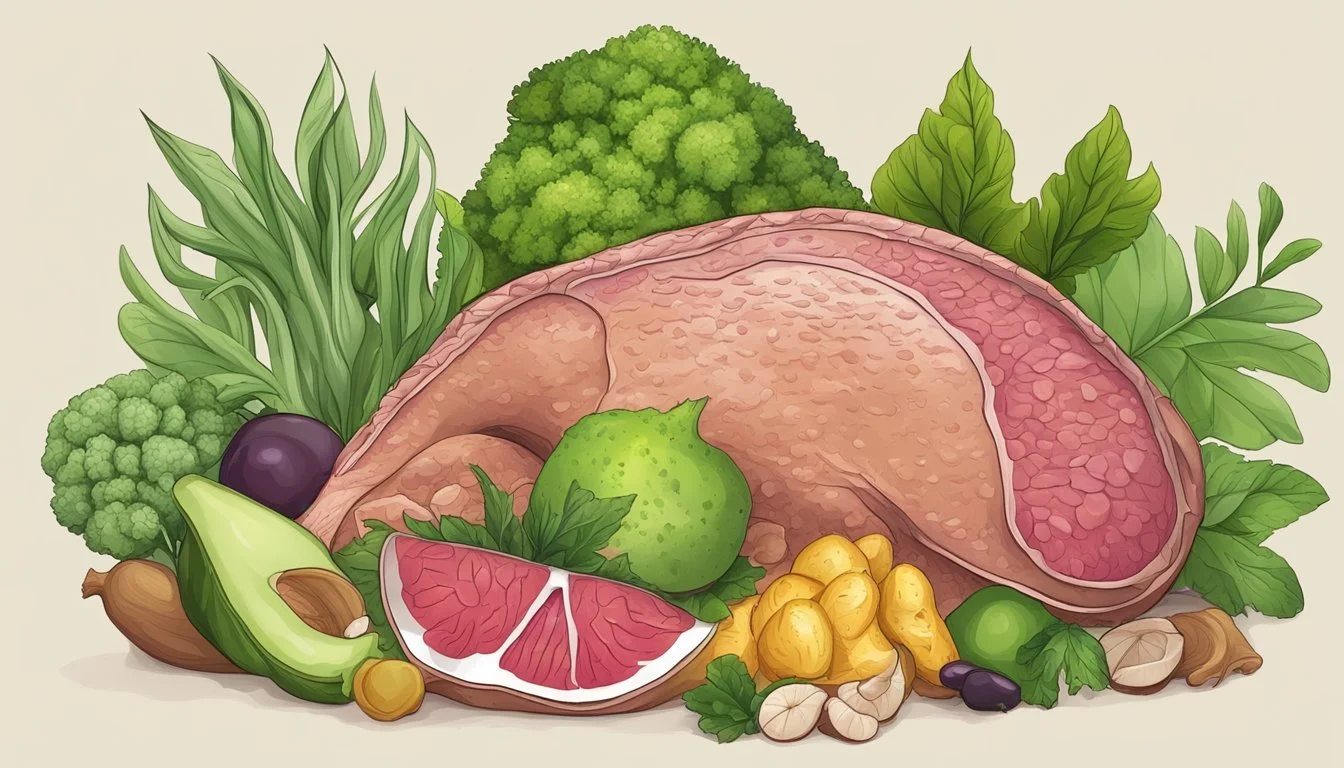Carnivore Diet Guide to Gallbladder Flush and Liver Detox
Effective Strategies for Optimal Health
For individuals seeking an effective method to support gallbladder and liver health, the combination of the Carnivore Diet with dedicated detox protocols offers promising results. The Carnivore Diet, which focuses purely on animal-derived foods, provides essential macronutrients, supporting overall health and reducing the intake of problematic plant-based substances. By exclusively consuming meat, eggs, and dairy products, followers can achieve a macro-nutrient profile that fuels the body efficiently while potentially aiding in the detoxification process.
On a gallbladder flush day, individuals are recommended to eat lightly until 2:00 pm and then stop eating, allowing only small sips of water. This preparation stage is crucial for the detox process to work effectively. Afterward, the introduction of an Epsom salt solution helps widen the gall bladder and liver ducts, facilitating the expulsion of stones and promoting better liver function.
Combining a regimented diet with strategic detox practices can significantly impact one's health, especially for those dealing with liver and gallbladder issues. By following these steps, the Carnivore Diet can be a practical and effective approach to achieving better organ health and overall well-being.
Overview of the Carnivore Diet
The carnivore diet focuses exclusively on animal products. It involves consuming meats, fish, eggs, and select dairy. No plant-based foods, vegetables, or grains are included.
Followers of the carnivore diet aim to get their nutrition from high-fat foods and animal proteins. This means meals often consist of steaks, liver, and eggs.
Common Foods in the Carnivore Diet:
Meats: Beef, pork, lamb
Fish: Salmon, tuna, sardines
Poultry: Chicken, turkey, duck
Dairy: Cheese, heavy cream
Others: Eggs, bone broth
Key Principles:
No Carbohydrates: Excludes all carbs, including sugar and fiber
Focus on Fat and Protein: Prioritizes high-fat and protein-rich foods
Animal Products Only: Plant-based foods are entirely avoided
The diet is sometimes compared to a ketogenic diet but is more restrictive, involving zero carbs. It claims to help with digestion issues by eliminating fiber and other plant-based elements.
Some people start this diet during a low-activity period to adjust more comfortably. It's essential to commit and plan meals carefully to meet nutritional needs effectively.
The Gallbladder and Liver's Role in Digestion
The gallbladder and liver are essential in the digestive process, particularly in the digestion of fats. They work together in producing and secreting bile, which facilitates fat digestion and ensures the body's metabolism runs smoothly.
Bile Production and Flow
The liver is responsible for producing bile, a fluid that aids in the emulsification and breakdown of fats. Once produced, bile is stored in the gallbladder. When food containing fat enters the small intestine, the gallbladder releases bile into the small intestine.
Bile flow is crucial, as it transports bile from the liver to the gallbladder and eventually to the small intestine. This system ensures that bile is available when needed. Disruptions in bile flow can lead to digestion issues and affect the body's ability to process fats efficiently.
Digestion of Fats
Bile salts in the bile are key players in fat digestion. They break down large fat molecules into smaller ones, making it easier for digestive enzymes to further process them. This is particularly important for saturated fats, which can be harder to digest.
Proper digestion of fats is vital for nutrient absorption and preventing digestive discomfort. Without adequate bile production and flow, fats might remain undigested, leading to symptoms like bloating and diarrhea. Ensuring a sufficient bile supply helps maintain a balance in the digestive system.
Liver Health and Function
The liver plays a multifaceted role in overall health and digestion. Aside from bile production, it detoxifies substances, aids in metabolism, and stores essential nutrients. The health of the liver directly impacts the efficiency of bile production and the digestion of fats.
Issues such as high cholesterol levels and fatty liver disease can impair liver function. Regular monitoring and a balanced diet are essential to support liver health. The carnivore diet, being high in fat content, particularly requires mindful consideration of liver health to ensure it does not lead to liver dysfunction.
The liver and gallbladder together form a vital partnership in the digestive system. They ensure that dietary fats are properly processed, which is crucial for maintaining energy levels and nutrient balance.
Nutritional Considerations on the Carnivore Diet
The carnivore diet emphasizes the exclusive consumption of animal products, requiring careful attention to various nutritional aspects. It is essential to understand the importance of essential vitamins and minerals, potential nutrient deficiencies, and how to manage digestion on a high-fat diet.
Importance of Essential Vitamins and Minerals
Animal products provide many vital nutrients. Meat, fish, and liver are rich in vitamins like B12 and D, and minerals such as iron and zinc. B12 supports nerve function and red blood cell formation. Vitamin D, often found in fatty fish and egg yolks, is crucial for bone health and immune function.
Iron from red meat plays a key role in oxygen transport and energy production. Zinc, found in beef and pork, supports immune health and wound healing. Ensuring a varied intake of animal proteins helps maintain balanced nutrient levels.
Risks of Nutrient Deficiency
Although the carnivore diet can be nutrient-dense, strictly limiting food choices may lead to deficiencies. For example, the lack of plant-based foods can result in low vitamin C levels, potentially impairing collagen production and immune function. While organ meats partially address this, they might not fully eliminate the risk.
Other potential concerns include inadequate fiber intake, which affects gut health, and a lack of potassium and magnesium, important for muscle function and heart health. Supplements might be necessary to fill these gaps, ensuring all nutritional needs are met.
To find the best deals, get vitamin C, fiber, potassium, and magnesium online!
Managing Digestion on High-Fat Diets
High-fat diets, such as the carnivore diet, require adapting the digestive system. Consuming large amounts of healthy fats like those from meat and fish can overwhelm those unaccustomed to such a regimen. Digestive enzymes and bile salts help the body process fats more efficiently.
Some individuals may experience digestive issues like constipation or diarrhea, largely due to the complete absence of dietary fiber. Staying hydrated and incorporating occasional small amounts of salt can support gut health and improve digestion. The inclusion of sources of saturated fats, like beef tallow and butter, alongside monosaturated fats from foods like bacon and eggs, can also make the diet more palatable and nutritionally beneficial.
For the largest selection, try buying tallow online!
Gallstones and Gallbladder Health Issues
Gallbladder health is critical to proper digestion and metabolic functions. Understanding the causes, symptoms, and management of gallbladder problems like gallstones is essential.
Causes of Gallbladder Problems
Gallbladder issues, such as the formation of gallstones, often arise due to imbalances in the substances that make up bile. Cholesterol and bilirubin can crystallize within the gallbladder, leading to stone formation.
High-fat diets and chronic carbohydrate intake can influence gallstone development. Chronic inflammation of the gallbladder, known as cholecystitis, may result from infections or blockages. Reduced bile salts can also contribute to gallstone formation, impairing gallbladder health.
Symptoms of Gallbladder Disorders
Symptoms of gallbladder disorders are varied and can include bloating, abdominal pain, nausea, and vomiting. Pain often occurs in the upper right abdomen and may spread to the back or right shoulder. Severe cases can cause diarrhea or constipation.
Inflammation can result in tenderness and discomfort, particularly after consuming fatty foods. This discomfort usually prompts medical assessment, often revealing underlying gallbladder disease.
Prevention and Management
Maintaining gallbladder health involves dietary and lifestyle adjustments. Reducing the intake of high-cholesterol foods and curbing excessive carbohydrate consumption can help. Incorporating regular physical activity also aids in managing weight and promoting healthy digestion.
For individuals prone to gallstones, gradual weight loss, rather than rapid reduction, is recommended to avoid exacerbating gallbladder issues. Bile salts supplements might be advised to prevent stone formation in high-risk individuals. Regular check-ups and ultrasounds can monitor gallbladder condition, allowing for early intervention if issues arise.
Carnivore Diet and Gallbladder Flush
The carnivore diet, comprising mainly animal products, can be paired with a gallbladder flush process to promote bile flow and the expulsion of gallstones. The diet’s high-fat content stimulates bile secretion, aiding in the effectiveness of the flush.
Principles of Gallbladder Flush
A gallbladder flush typically involves fasting and consuming specific substances to encourage bile duct relaxation and the expulsion of stones. Epsom salts are often used as they help to widen the bile ducts. This process may also involve the consumption of a mixture of olive oil and lemon juice.
The high-fat nature of the carnivore diet is beneficial here since increased fat intake stimulates bile production, essential for a successful flush. Moreover, a temporary switch to lighter eating can prepare the system for the cleanse.
Recommended Ingredients for Flush
Key ingredients in gallbladder flushes include Epsom salts, olive oil, and lemon juice. Epsom salts help to relax the bile ducts, making it easier for stones to pass. Olive oil is consumed to stimulate bile release, while lemon juice aids in digestion and stone expulsion.
Apple juice or grapefruit juice can be added to soften gallstones, although these are less common in a carnivore-based approach due to their carbohydrate content. The focus remains on using minimal plant-based products to align with carnivore diet principles.
Liver Detox on a Carnivore Diet
Supporting liver detox on a Carnivore Diet involves understanding the body's natural processes and integrating specific herbs and supplements to enhance liver function without straying from the diet principles.
Natural Detoxification Process
The liver naturally detoxifies the body by breaking down toxins, filtering blood, and secreting bile for digestion. A Carnivore Diet, rich in proteins and healthy fats, can support liver function by providing essential amino acids critical for liver health and regeneration.
High-quality animal proteins deliver essential amino acids such as methionine and cysteine, vital for detoxification. These amino acids support the production of glutathione, a powerful antioxidant that protects liver cells from damage and aids in processing and eliminating toxins. Additionally, healthy fats from animal sources promote bile production, assisting in fat digestion and the removal of fat-soluble toxins.
Herbs and Supplements for Liver Support
While the Carnivore Diet focuses on animal-based foods, some herbs and supplements can be incorporated without straying from its core principles. Milk thistle, for instance, is renowned for its liver-protective properties, helping to reduce inflammation and promote the regeneration of liver cells. Additionally, turmeric contains curcumin, which has strong anti-inflammatory and antioxidant effects beneficial for liver health.
For those following a strict Carnivore Diet, these supplements can be taken in capsule form. Another valuable supplement is taurine, an amino acid found in meat that supports bile salt formation, essential for fat digestion and detoxification processes. These targeted supplements alongside a meat-focused diet can enhance liver function and overall detoxification efficiency.
Possible Side Effects and How to Mitigate Them
Embarking on a carnivore diet can lead to various side effects, both short-term and long-term. It is important to be aware of these potential issues and understand how to address them.
Short-Term Side Effects
Short-term side effects often manifest during the initial stages of the dietary shift. Diarrhea is common, likely due to the sudden increase in protein intake and changes in gut bacteria. Staying hydrated and gradually transitioning to the diet can help.
Constipation may occur from the lack of fiber. Incorporating organ meats, which are rich in nutrients, could alleviate this. Nausea and vomiting may happen as the body adapts; sticking to easily digestible meats can ease these symptoms.
Some individuals face bloating and abdominal pain. This can result from gallbladder inflammation or difficulty digesting high-fat meals. Taking digestive enzymes, such as lipase, and reducing fat intake temporarily might mitigate these issues.
Long-Term Considerations
Long-term adherence to a carnivore diet may pose risks if not managed properly. Gallbladder issues such as gallstones or inflammation could develop due to high-fat consumption. Regular check-ups and possibly supplementing with ox bile are advisable.
Chronic digestion issues are potential concerns. Digestive health can be maintained by including bone broth to support gut lining and ensuring hydration. If gallbladder inflamed, consult a healthcare professional to avoid complications like gallbladder removal or gallbladder surgery.
Additionally, careful monitoring for signs of high blood pressure and cardiovascular issues is suggested due to the diet's high saturation of fats. Regular blood work and consulting a nutritionist can help manage these risks.
Interacting with Healthcare Professionals
Consulting healthcare professionals is crucial for safely managing gallbladder health, especially during diet changes or post-surgery. This will ensure proper diet adjustments and overall well-being.
When to Seek Medical Advice
It is essential to involve healthcare professionals if you experience persistent abdominal pain, jaundice, or other digestive issues. These symptoms may indicate gallstones or complications requiring medical attention.
Before starting any detox or following a strict diet like the carnivore diet, consult with a registered dietitian or physician. They can provide tailored advice based on your individual health status and medical history. For those with a history of gallbladder issues, professional guidance is necessary to avoid exacerbating existing conditions.
Post-Surgery Dietary Considerations
After gallbladder removal, the body’s ability to digest fats changes, making dietary adjustments critical. Healthcare professionals can recommend suitable fats and proper meal timing to aid in digestion.
Those adhering to the carnivore diet post-surgery should focus on easily digestible animal-based foods and monitor their response to high-fat intake. Regular follow-ups with a dietitian can help optimize nutrition and prevent digestive discomfort. Maintaining hydration and gradually introducing fats into the diet can improve overall well-being and support digestion.
Lifestyle Adjustments for Optimal Health
Achieving optimal health on a carnivore diet requires thoughtful lifestyle adjustments. Integrating balanced dietary practices and regular physical activity can enhance overall well-being and support gallbladder and liver functions.
Balancing Carnivore Diet with Other Foods
Though the carnivore diet focuses on animal products, incorporating intermittent non-animal items can provide essential vitamins not present in meats. Occasional intake of leafy greens or berries can supply antioxidants without significantly deviating from the diet’s principles. These additions can improve digestion and bolster immune function.
It's critical to prioritize healthy fats from sources like fish, beef, and eggs. These fats aid in the digestion of fats and support hormonal balance. Avoiding excessively greasy foods can help maintain cholesterol levels and reduce stress on the liver and gallbladder.
Another consideration is hydration. Drinking ample water facilitates digestion and metabolism. Bone broth, rich in minerals and electrolytes, can be a valuable addition. This practice ensures that nutrient absorption remains efficient while on a strict carnivore regimen.
Importance of Physical Activity
Regular physical activity is crucial for maintaining optimal health alongside the carnivore diet. Exercise supports cardiovascular health, aids in weight loss, and improves overall energy levels. Activities such as walking, weight lifting, or swimming can be incorporated based on individual preferences and fitness levels.
Exercise also enhances circulation, promoting efficient nutrient delivery to cells and expediting waste removal. Engaging in 30 minutes of moderate exercise most days of the week can significantly benefit liver and gallbladder function, assisting in the regular digestion of fats.
Further, physical activity helps regulate blood sugar levels, reducing the risk of insulin resistance. Flexibility exercises, like yoga, can alleviate muscle stiffness and improve overall mobility. Balancing diet with consistent exercise results in better health outcomes and a more sustainable lifestyle approach.
Success Stories and Anecdotal Evidence
Several individuals have shared personal experiences and stories related to the carnivore diet's impact on gallbladder and liver health. These anecdotes provide insights into real-life outcomes and can serve as inspiration or caution for those considering this dietary approach.
Personal Experiences with the Carnivore Diet
Many people have turned to platforms like YouTube and online forums to share their testimonials about the carnivore diet's effects on bodily functions. One such testimonial is from individuals who saw significant improvements in their gallbladder health after adhering to a strict meat-only diet.
Specific cases mention reduced gallbladder pain and improved digestion within weeks. Users often highlight the importance of initial adaptation phases and how certain symptoms may subside after some time. Increased bile secretion, essential for fat digestion, has been frequently noted. Users also report relief from chronic issues such as gallstones and general discomfort.
Case Studies on Liver and Gallbladder Health
Case studies and scientific discussions have shown mixed reactions towards the carnivore diet's impact on liver health. Some research suggests that a high-fat intake can increase bile production, aiding liver and gallbladder function.
A notable study involved participants who switched to the carnivore diet post-gallbladder surgery. These participants generally reported positive outcomes, including stabilized bile levels and improved digestion. In a few instances, prolonged use of the diet helped in reducing liver enzyme abnormalities, a crucial indicator of liver health.
While these case studies present promising results, it is essential to consider them alone. Individual responses can vary significantly, and those with existing liver or gallbladder issues should consult healthcare professionals before making dietary changes.











